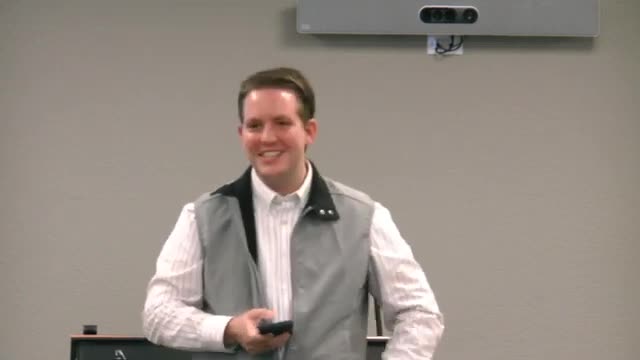Visiting officials outline federal, state priorities for Alva area at community coffee
Get AI-powered insights, summaries, and transcripts
Subscribe
Summary
Federal and state officials who spoke at an Alva community coffee discussed proposed federal bills affecting Taiwan and air-traffic training, concerns about tariffs and Medicaid, a state investigation into mental-health finances, and local infrastructure and parks needs including Alabaster Caverns.
A field representative for U.S. Rep. Frank Lucas and Oklahoma state leaders used a community coffee in Alva to outline federal and state legislative priorities and local needs, including bills aimed at deterring aggression against Taiwan, preserving an air-traffic training center, concerns about tariffs and Medicaid changes, an ongoing state probe of the Department of Mental Health and Substance Abuse finances, and infrastructure and state-park maintenance needs.
Nathan Detlaw, field director for Congressman Frank Lucas, told attendees he was in Alva to describe several bills his office is supporting, including measures to create additional penalties for China if it blockades or invades Taiwan and a bill to keep the Mike Monroney Aeronautical Center in Oklahoma City operating during federal shutdowns. “We need to make sure that’s introduced,” Detlaw said, noting the center trains air-traffic controllers in a 13-week program. He also described a proposal to add the U.S. secretary of agriculture to a federal board that reviews foreign land purchases near sensitive sites, and flagged agricultural exports as a local economic priority: “Forty percent of our hard red winter wheat is exported. Eighty percent of our cotton that we grow in Oklahoma is exported,” Detlaw said.
Detlaw discussed the potential for new tariffs announced at the federal level to affect local producers and manufacturers, and said the administration’s approach has so far been to use tariffs as leverage in negotiations. On domestic spending, he cautioned that discussions about cutting programs such as Medicaid are focusing first on fraud and eligibility, and said, “We need to use a scalpel not always a chainsaw,” when trimming federal spending.
Lieutenant Governor Patrick, who spoke after Detlaw, described several state-level concerns he has raised with the legislature and with communities across western Oklahoma. He said the Oklahoma House has begun investigating finances at the Oklahoma Department of Mental Health and Substance Abuse after staff reported varying shortfalls in the department’s accounts. “They said there was a $60,000,000 shortage. Then there was a $40,000,000 shortage. They cut down to $6,000,000. So we’re trying to figure out where the finances are going,” he said, describing the inquiry as public and ongoing.
The lieutenant governor emphasized infrastructure shortfalls in many rural towns, including aging water and sewer lines that limit housing and economic growth. He cited Durant as an example, saying the town relies on a 10-inch water line that constrains development, and described McAllister losing a potential economic development project because of inadequate sewage capacity. He urged the legislature and local governments to consider revolving funds or matching programs to fund major upgrades.
Tourism and state parks also featured in the discussion. The lieutenant governor said a recent internal estimate placed deferred maintenance for Oklahoma’s state parks at about $300 million, and urged greater investment and public-private partnerships to open and expand attractions. He specifically urged more work on Alabaster Caverns (referred to in the meeting as “Alabaster” attractions), saying the park’s full cave tour remains closed and estimates to reopen further areas run into the low millions of dollars. “Alabaster is unique and it needs to be an investment,” he said.
Speakers tied infrastructure and parks investment to workforce and economic development. The lieutenant governor noted that childcare closures and limited housing stock hinder employer recruitment and workforce retention, and said strengthening career-technical education and regional universities is central to workforce strategy. He also said Oklahoma’s bridge repairs and paving projects have been a legislative focus and stressed the need to maintain progress rather than rely on one-time federal relief funds.
Local chamber co-directors Jody Bridal and Megan Lear opened the meeting with community announcements and asked attendees to sign up for the chamber newsletter about upcoming events. Bridal introduced the visiting officials and invited questions.
No formal votes or motions were taken at the community coffee. Presenters encouraged residents and local officials to contact federal and state offices with priorities and project details.
The meeting combined federal policy updates (tariffs, foreign-policy-related bills, and federal facility protections), state-level fiscal and oversight matters (a House inquiry into the mental-health department and budget debates over tax cuts), and local infrastructure and tourism planning. Attendees were urged to provide project-level information to state and federal offices to pursue matching funds and legislative remedies.
